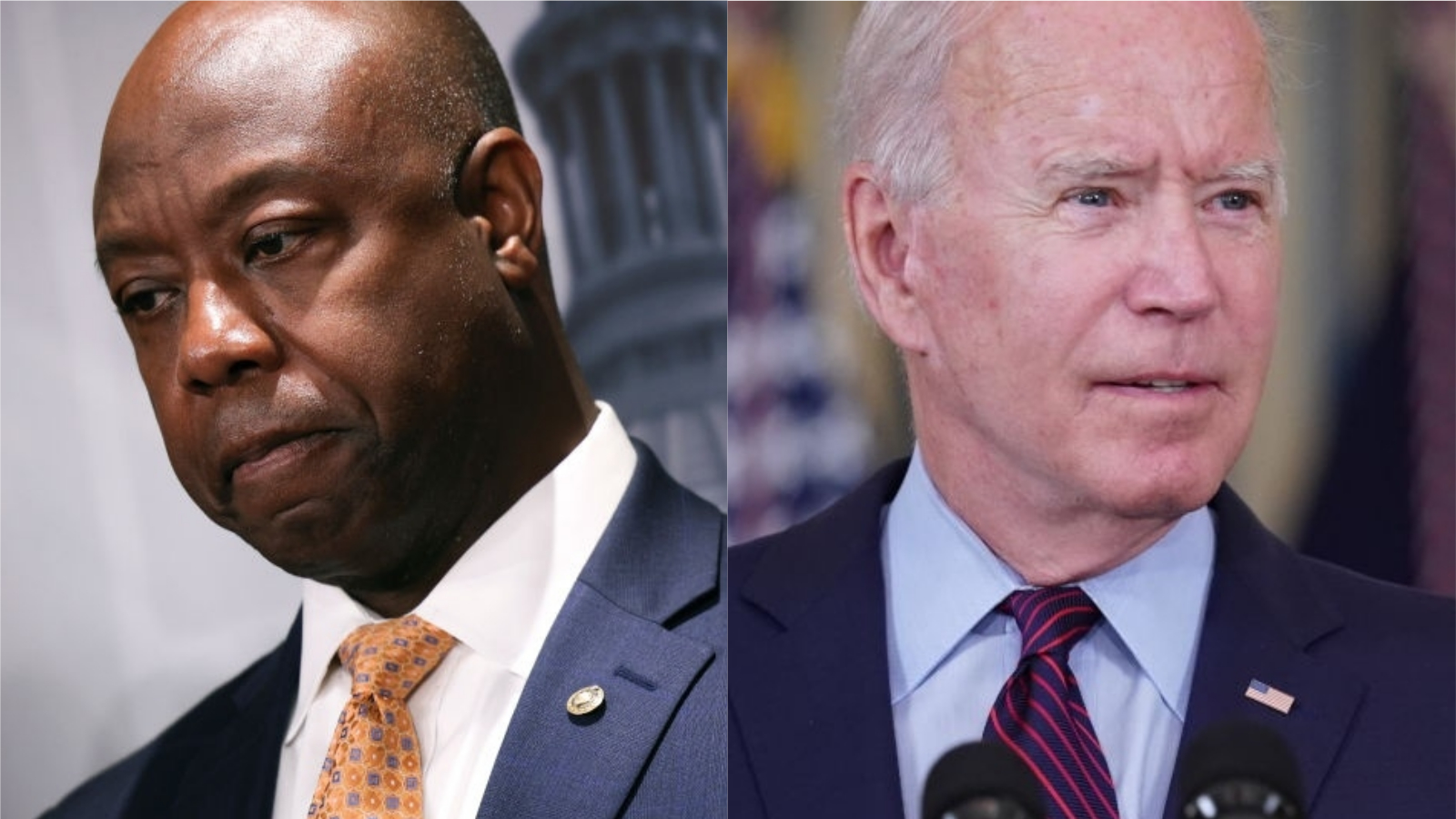President Joe Biden and Sen. Tim Scott (R-SC) are exchanging recriminations after efforts toward police reform failed to pass in Congress.
Both Biden and Scott, in different but similar ways, bear the blame for the failure to pass legislation to curb unjust violence and racial bias in policing. Both politicians have taken an approach to reform that sought to balance competing interests, and they were ultimately unable to pull off the balancing act.
In late September, the Wall Street Journal reported that Congress had given up on negotiations to pass the George Floyd Justice in Policing Act into law. The legislation was of course named in honor of George Floyd, whose murder at the hands of police officer Derek Chauvin in May 2020 sparked a massive round of national and international protests against police brutality, racism and other forms of oppression.
As detailed on Congress’ website, the George Floyd Act addresses many of the concerns raised by activists and protesters, as the proposed law “increases accountability for law enforcement misconduct, restricts the use of certain policing practices” such as chokeholds and no-knock warrants, “enhances transparency and data collection” through the creation of a National Police Misconduct Registry, and “establishes best practices and training requirements,” including trainings that address racial profiling and implicit bias.
Sen. Tim Scott (R-SC) had been working with Sen. Cory Booker (D-NJ) and Rep. Karen Bass (D-CA) on the legislation, with Biden urging its passage. It passed the House earlier this year but has now died in the Senate.
As expected in the politically polarized environment in which we find ourselves, Republicans and Democrats are each blaming the other. Biden faulted Republicans in a White House statement on the bill’s failure, arguing that “Senate Republicans rejected enacting modest reforms, which even the previous president had supported, while refusing to take action on key issues that many in law enforcement were willing to address." Sen. Scott, meanwhile, has blamed the “defund the police” movement and Democrats, including claiming in a CBS interview that Sen. Booker “wanted me to agree to limited or reduced funding for the police” and falsely labeling the bill as a “defund” measure.
There is plenty of blame to go around for a variety of political actors, from Republicans in Congress who almost uniformly opposed even the mildest reforms to conservative Democrats like Sens. Joe Manchin (WV) and Sen. Kyrsten Sinema (AZ) refusing to abolish the filibuster that empowers Republican obstructionism. But Biden and Scott bear a specific type of blame for assuming leadership roles in the push for reform but being unwilling to make the sacrifices that were necessary to get the job done.
Bridgett Floyd recently told CNN that she faults Biden for failing on the promise he personally made to her and her family to ensure passage of the bill that bears her brother George’s name.
"People are out here in desperate need (for police reform),” she told the news outlet last week, “and I don't feel that Biden is stepping up as the president and doing the right thing."
As NPR recently pointed out, Biden has a complicated history with police and criminal justice, to say the least. His role in engineering tough-on-crime legislation during the 1990s and his past and present cozy relationship with law enforcement is a double-edged sword. Biden's history gives him some clout in advocating for reform without seeming to be anti-police, but it also leaves the president with a lot of baggage to carry as he attempts to reform a system he helped design and promote.
Even now, while Biden has been expressing his willingness to use executive action to implement some of the police reform agenda, he has also been meeting with police chiefs and mayors and pledging White House support for fighting rising crime rates, an agenda that in practice serves Republican interests and deflects from police reform measures.
Meanwhile, Sen. Scott has been attempting an even more difficult balancing act. As the only Black Republican in the Senate, he has often been stuck between a party that deals with its own racism by pretending that it doesn’t exist and an African American community that views Black Republicans as collaborators with the enemy.
For a while, Scott seemed to be pulling it off, arguing that the country and the Republican Party had made progress while pushing his colleagues to embrace reform. But sooner or later, this balancing act had to end, and Scott would be forced to pick a side. When that moment came this month, Scott made his choice clear, siding with his party, which shot down the Senate bill, and disingenuously blaming Democrats for the failure.
Biden won't flex his political muscle more fully behind police reform, even if it cost him some of his pro-police and bipartisan street cred. Scott is declining to speak the truth about his own party, which continues to use the senator as the GOP’s “Black friend” in order to give cover to its own shortcomings and failure to have a real reckoning over race.
Now, two of the most prominent voices in U.S. government who'd been working on police reform ultimately fell off the tightropes they were walking, crushing the hopes of our communities on their way down.
